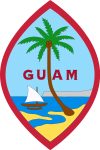| ||||||||||||||||||||
Gubernatorial election | ||||||||||||||||||||
| ||||||||||||||||||||
| ||||||||||||||||||||
| Elections in Guam |
|---|
 |
General elections were held in Guam on 7 November 1978 to elect the Governor, Lieutenant Governor, members of the Legislature, the island's United States House of Representatives delegate and members of the Territorial Board of Education, as well as determining whether Judge Richard H. Benson from the Superior Court should remain in place. [1] Primary elections were held on 2 September. [1]

